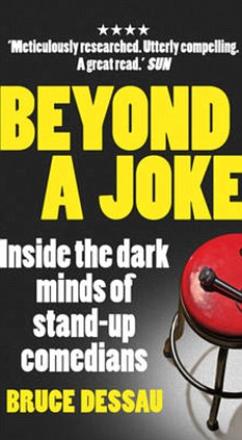
A few years ago I wrote a book about the history of comedians, homing in on the “sad clown” phenomenon and wondering why so many comedy greats from Grimaldi to Hancock and beyond seemed to be troubled souls offstage.
At the time I thought the idea was quite original. But the TV world was obviously thinking on the same lines. While I was writing Beyond A Joke, the BBC made a series of dramas about famous lives behind the laughter. They focussed on the likes of Tony Hancock, Kenneth Williams and Frankie Howerd among others. Hancock and Howerd inevitably featured heavily in my book too.
And this Easter Monday, in case you didn’t already know, ITV1 is screening Not Like That, Like This, which looks at the other side of Tommy Cooper, tackling his affair with assistant Mary Kay and his battle in later life with alcohol. Cooper also featured heavily in my book. You can read an excerpt on him here.
But actually I don't think Cooper necessarily fitted into the sad clown template. I think he was a rarer bread among comedians – an uncomplicated happy soul, rather like Eric Morecambe. It was just the pressure of the job that got to him in the end. As he once said, people think all he has to do is walk onstage and they will laugh, but people don’t realise how much effort it takes for him to walk onstage like that.
So are comedians per capita more troubled that the rest of us? Ruby Wax, who thinks mental health is a widespread malaise, once said that she had encountered as many builders as comedians with mental health problems. Jo Brand, on the other hand, has said that she has had words with a few comedians she has met on the circuit and advised them to seek expert help.
The truth is probably somewhere in the middle. Sometimes answers are clear than others. Spike Milligan’s issues were probably related to post traumatic stress syndrome after his WW2 experiences. Others are troubled for other reasons, the death of a parent at a pivotal point, lack of familial love. And others are troubled for no apparent reason at all.
Jason Manford, who appears in the drama, had an interesting theory that comedians are so exceptionally happy onstage it would be downright weird if they were the same offstage: "I do know that most performers are flawed in some way, they have a vice or something that balances them out and makes them more normal. Imagine if they were all just clowns all the time, if anything that would be stranger than them having a dark side." In a way their misery when not working is a natural counterweight to their levity on the job.
I think it is this stark contrast that intrigues people. The comedy greats were able to unite whole nations in laughter and yet while their TV programmes were going out they might be at home by themselves with a long face. Reading your reviews probably doesn't do much for the well-being of the psyche either. Bad ones are simply depressing, good ones just create more pressure to be good again.
There is also the contrast of the adrenaline rush of live performance and the comedown afterwards. The bigger you get, the more the contrast and it would not be a surprise if it had an effect on your stability. That’s why it is so weird that Eric Morecambe seemed so well adjusted, given how successful he was. He just seems to have been one of those people who was happy to be always "on". Others deal with it less well. As Janis Joplin said, “I make love to 25,000 people, then I go home alone.” But then what did she know? Janis Joplin never played the midnight show at the Comedy Store.
Not Like That, Like This is on ITV1 on Easter Monday at 9pm.


